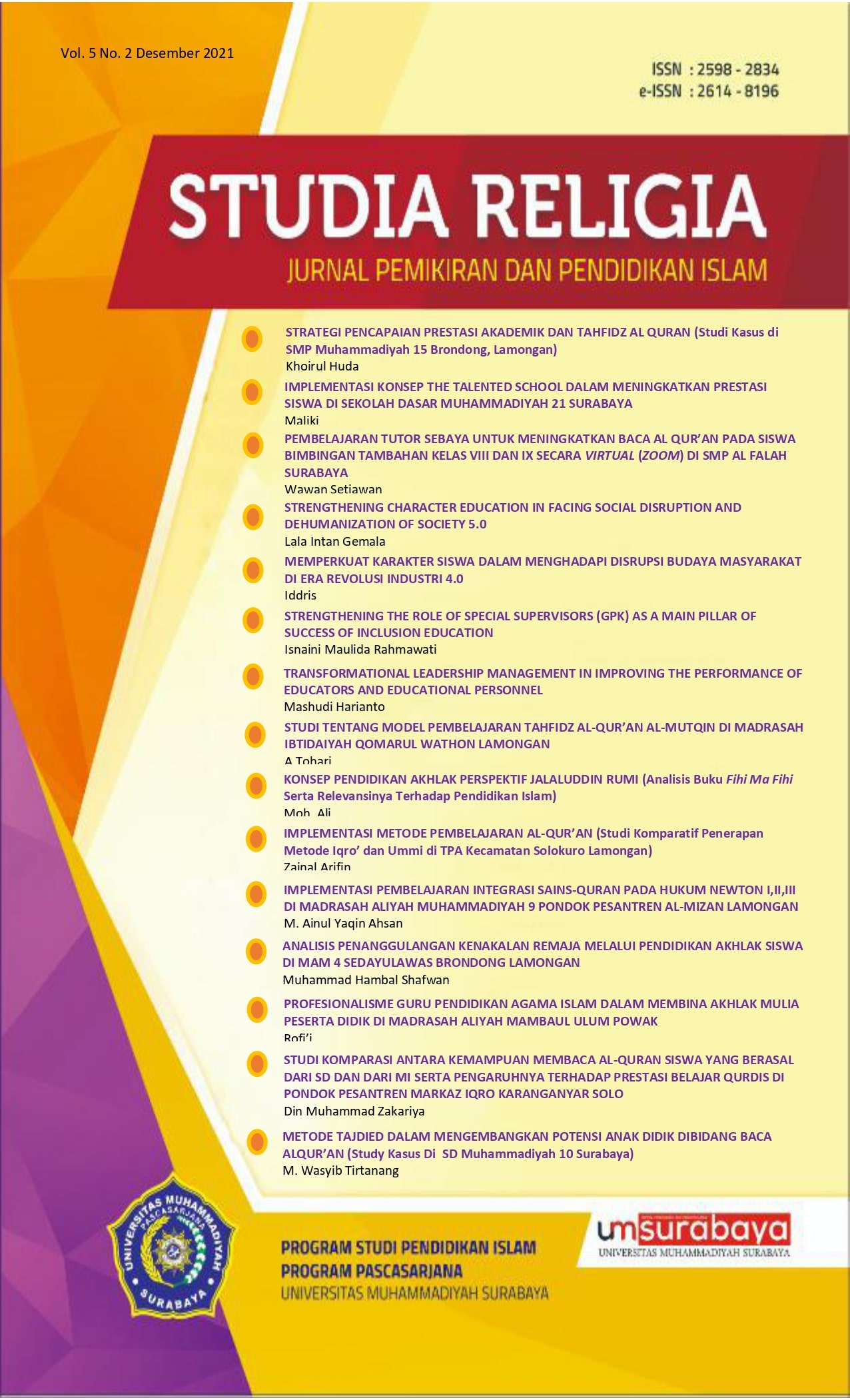STRENGTHENING THE ROLE OF SPECIAL SUPERVISORS (GPK) AS A MAIN PILLAR OF SUCCESS OF INCLUSION EDUCATION
DOI:
https://doi.org/10.30651/sr.v5i2.10220Abstrak
This study aims to describe the importance of optimizing the strategic role and the main task of special supervisors (GPK) in inclusive schools. An inclusive school is a formal educational institution that organizes a special education system for children who have limitations and special needs. The implementation of inclusive education can be carried out in general schools by providing a special portion of time for learning by bringing in special mentoring teachers (GPK) who are assigned to guide and provide special services on inclusive education. On the other hand inclusive education can also be held independently in a formal institution with a learning system that is constructed based on the needs of students such as SLB (Extraordinary Schools). The method used in this research is descriptive qualitative research. With this research it is expected to reveal various qualitative information with careful and meaningful analysis-descriptions. Data sources in this study include principals, special supervisors and class teachers. Data collection is done by interview, observation, and documentation. As for the data analysis techniques through the stages of data reduction, data presentation and data analysis. The context of this research is the implementation of inclusive schools in Sidoarjo district for elementary and junior high school levels. The results of the study include (a) Knowing the model of implementing inclusive education in general schools by bringing in special tutors (GPK) (b) The importance of the presence of special tutor teachers (GPK) for the success of inclusive education in accordance with MoNE Regulation No. 70 of 2009.Referensi
Yusuf, Munawir. Self-Evaluation of Inclusive Schools: A Guide for Schools Providing Inclusive Education. (Solo Triumvirate. 2014)
World Conference on Special Needs Education: Access and Quality (1994) The Salamanca Statement and Framework for Action on Special Needs Education. Salamanca, UNISCO & Minstry of Education and Science, Spain
Nana Syadoih Sukmadinata, Educational Psychology Platform, (Bandung: PT Remaja Rosdakarya, 2004), p. 49
Abin Syamsudin, Educational Psychology, (Bandung: PT Remaja Rosda Karya, 2005), p. 58
Law No. 14 of 2005
Istikomah and Eni Fariyatul Fahyuni, (2016) Psychology of Learning and Teaching (Key to Teacher Success in Educative Interaction) Nizamia Learning Center, Sidoarjo, ISBN978-602-6937-30-8
Wina Sanjaya, Learning Strategies; Oriented Education Process Standards, (Jakarta: Kencana Prenada Media Group, 2008), p. 210
Bachtiar, W. Da'wah Research Methodology. 1st cet. Wacana Ilmu, Logos Jakarta. 1997
Lexy J. Moleong, Qualitative Research Methodology, (Bandung: Youth Rosdakarya, 2002), p. 329
Sudarwan Danim, Becoming a Qualitative Researcher, (Bandung: Pustaka Setia, 2002), p. 26
Alimin, Zaenal, 2011, developing Inclusiveness in Education, Paper, Jakarta: Plan Indonesia.
Nuraeni, 2014, Inclusive education in PAUD Institutions, Journal of Educational Editions, December, Vol, 13.
Kustawan Dedy and Hermawan Budi, (2013), Model Implementation of Child Friendly Inclusive Education, Jakarta: PT Luxima Metro Media.
Smith, David. (2006). Inclusion, Friendly School for All. (Translation). Bandung: Shades Publisher
Budi S, (2010), Alternative Schools Why Not ?, Yogyakarta: Diva Press.
Ministry of National Education, (2003), Law Number 20 Year 2003 Concerning the National Education System, Jakarta.
Divine, Mohammad Takdir, (2013) Inclusive Education: Concepts and Applications, Yogyakarta, Ar-Tuz Media
Yusuf, Munawir. 2014. School Management Based on Inclusive Education. Solo: Triumvirate
Triani, Nani. 2012. Guide to Assessment of Children with Special Needs. East Jakarta: Luxima Metro Media.
Sunaryo. (2009). Inclusive Education Management. Papers of the National Seminar on PLB FIP UPI - February 2009.
Tarsidi D (2003) The implementation of inclusive education in Indonesia. Paper presented at the 8th international congress including children with disabilities in the Community, stravanger, Norway, 15-17 June 2003
Stubs, (2002) in inclusive education where there are few resourcies, olso tge atlas Allience.
Aria Indrawati. "Special Teacher Teacher, an Important Pillar Supporting the Inclusion Education System". Downloaded at http: // www. Mitranetra.or.id Accessed 26 December 2014.
Brunetta R Wolfman, The Role of Women, (Yogyakarta: Canisius, 1992), p. 10
Kozier Barbara, The Role and Mobility of Community Conditions, (Jakarta: Gunung Agung, 1995), p. 31
Soerjono Soekanto, Sociology An Introduction, (Jakarta: Rajawali Press, 2009), p. 212-213
Kanfer R, Task-specific motivation: An Integrative Approach to Issues of Measurement, Mechanisms, Processes, and Determinants, in the Journal of Social and Clinical Psychology, 1987, p. 237-264
Sari Rudiati, Roles and Duties of Special Supervising Teachers in Integrated Education, in the Special Education Journal, Vol. 1 No. June 1, 2015, p. 21
Lailil Akhlaqul Yaum, The Effect of Education Qualifications on Working Period and Employment Status on the Optimization of Main Tasks and Functions of Special Teacher Teachers in Surabaya Inclusive Elementary Schools, in Special Education Journal, p. 2
Dieni Laylatul Zakia, Hacking Scientific Publications in the Field of Reputational Journal Education, in the Journal of Special Teacher Teachers (GPK): Pillars of Inclusive Education, 2015, p. 112
Sukarso, eckhojatmiko, (2009) School Management for Providers of Inclusive Education, Jakarta, Ministry of National Education
Nana Syadoih Sukmadinata, Educational Psychology Platform, (Bandung: PT Remaja Rosdakarya, 2004), p. 49
Sari Rudiati, Roles and Duties of Special Supervising Teachers in Integrated Education, in the Special Education Journal, Vol. 1 No. June 1, 2015, p. 21
Elly Manizar, "The Role of Teachers as Motivators in Learning", in the Raden Fattah Journal "Tadzrib", Volume 1, No.2. December 2015, p. 179
Wina Sanjaya, Learning Strategies; Oriented Education Process Standards, (Jakarta: Kencana Prenada Media Group, 2008), p. 210
Syaiful Bahri Djamarah and Aswan Zain, Teaching and Learning Strategies, (Jakarta: Rineka Cipta, 1997), p. 41
Unduhan
Diterbitkan
Terbitan
Bagian
Lisensi
Penulis tetap memegang hak atas karyanya dan memberikan hak publikasi pertama kepada jurnal ini yang secara simultan karya tersebut dilisensikan di bawah:
Creative Commons Attribution-NonCommercial 4.0 International License









